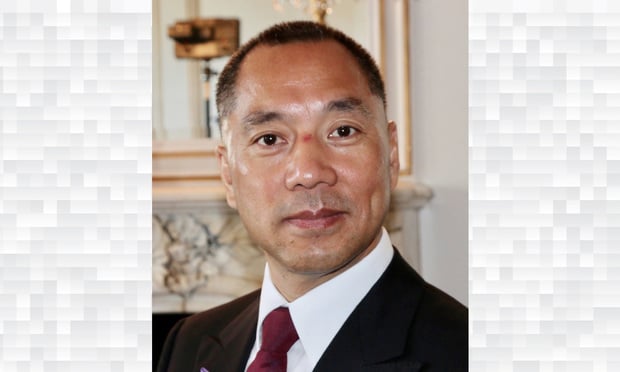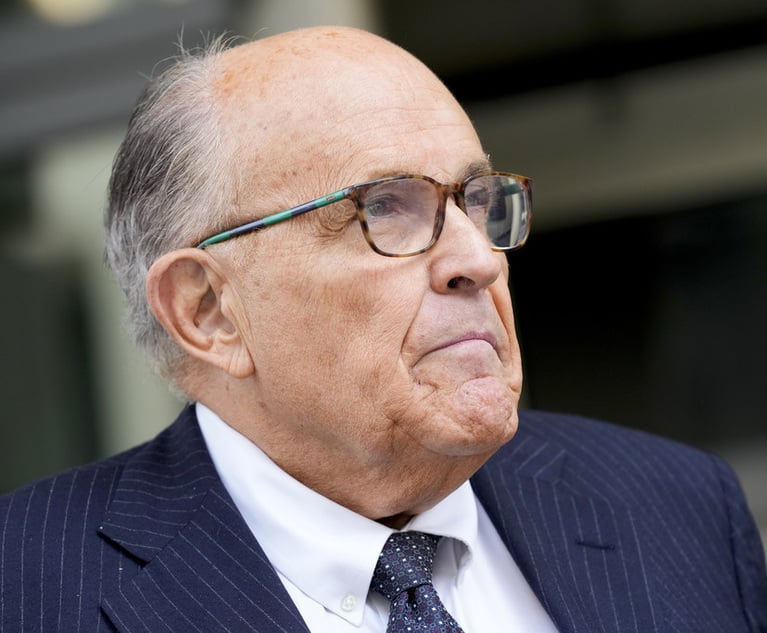Boies Schiller Faces $3M Malpractice Suit From Exiled Chinese Billionaire
David Boies said he is putting Guo Wengui and his attorneys on notice to withdraw the malpractice suit or face costs. Guo's attorney won't budge.
January 02, 2019 at 06:10 PM
5 minute read
 Guo Wengui in April 2017. (Photo: Voice of America via Wikimedia Commons)
Guo Wengui in April 2017. (Photo: Voice of America via Wikimedia Commons)
Boies Schiller Flexner's legal fees dispute with exiled Chinese businessman Guo Wengui has suddenly escalated, with Guo filing a $3.06 million malpractice suit, including punitive damages, against the firm and partner Josh Schiller.
Guo's suit, filed Dec. 31 in Manhattan Supreme Court, alleges Schiller, son of founder Jonathan Schiller, was unprofessional and repeatedly made derogatory comments in the course of the firm's representation. Guo's suit also alleges Boies Schiller mishandled information in Guo's asylum application and inappropriately applied his retainer to increase its interest costs.
In a joint interview Wednesday, Boies Schiller chairman David Boies and Josh Schiller forcefully rejected the allegations, asserting much of Guo's Dec. 31 complaint was already addressed and rejected by an arbitrator in an underlying arbitration over unpaid legal fees.
“The plaintiff and his attorneys are being put on notice that if the lawsuit is not withdrawn immediately we will pursue them for damages and costs because the lawsuit is totally frivolous and without basis,” Boies said. “First, there is no merit whatsoever in the allegations in the complaint. Two, the allegations in the complaint have already been rejected by a neutral arbitrator and this is simply an attempt to end-run the arbitration that has already taken place and that they have already lost.”
But Guo's attorney, Aaron Mitchell of the Law Offices of Cohen & Howard, said in an interview Wednesday that he doesn't see any reason to withdraw his client's Dec. 31 suit against Boies Flexner.
“The lawsuit is not frivolous” and is not subject to an arbitration order, Mitchell said, noting the arbitration was over a fee dispute, not malpractice claims.
Guo, a real estate tycoon who is also known as Miles Kwok. has made headlines for his allegations about widespread corruption of Chinese government officials. He left China at the end of 2014 and is seeking political asylum in the U.S. Most recently, Guo has been in the news for a reaching a settlement with Roger Stone and teaming up with former White House strategist Steve Bannon to investigate Chinese corruption.
Many headlines also spring from his multiple litigation matters. In a New York Times profile in January 2018, Guo claimed to be amassing a “war chest” of $150 million to cover his legal expenses.
Boies had represented the Chinese businessman between May 2017 and December 2017 in about five separate litigation matters, according to court papers. The relationship ended in late 2017. Kwok refused to pay the firm's legal bills, the firm said.
Boies Schiller in January 2018 initiated arbitration, and in October 2018, New York-based JAMS arbitrator Frank Maas ordered Guo to pay about $627,000 in fees and interest to Boies Schiller. In November 2018, Boies Schiller went to court to confirm the arbitration award. Guo still hasn't responded to that suit.
'Derogatory and harassing statements'
A little more than a month later, Guo on Dec. 31 filed his suit for malpractice. Guo claims malpractice over the alleged mishandling of his asylum application, claiming he learned during the fee arbitration that Schiller had released Guo's application for political asylum “without his permission, causing portions of Guo's application for asylum to be read into the record.”
Guo said he didn't retain Boies Schiller to represent him in his political asylum bid and shared the asylum information with the firm in confidence. Schiller, Guo claims, did not have his written consent, the right under the law, or the approval of the attorney general to turn over the asylum details.
Guo claims Schiller was aware there were attempts to kidnap Guo and Chinese officials had “even hacked a former law firm” that represented Guo seeking to steal his asylum application from its servers. In 2017, the Clark Hill law firm confirmed it had been the subject of a cyber-attack that affected a single client.
As a result of the disclosure of Guo's application for political asylum, Guo said he feared for the safety of himself and others and had to take extra security precautions.
In his breach of fiduciary duty claim, Guo said Boies inappropriately didn't apply a $500,000 retainer to its bills, allowing for a greater interest calculation in the arbitration award.
Guo also blames Schiller for allegedly making unprofessional and “derogatory and harassing statements.” For instance, Guo claimed, Schiller referred to Guo and his staff as “assholes” during a conference call with outside participants; used a sexual slur to refer to an employee of Guo; and threatened Guo's daughter. (Guo said that after he terminated the firm Schiller texted his daughter—a “talented and aspiring filmmaker”—to question her credibility and threatened “to destroy her reputation in the 'art world'” if Guo did not pay Boies Flexner $2 million.)
“Schiller's attempts to extort” Guo through his daughter, the suit alleges, “was an unconscionable act for anyone, let alone an attorney at law.”
(Maas, in his arbitration ruling, briefly addressed the alleged “boorish” behavior by Schiller. “Although the impropriety” of a “speakerphone incident is essentially conceded,” Maas wrote, Schiller disputed Guo's allegations regarding other alleged misbehavior. Maas said there was no need to make findings as to whether other incidents took place because they don't provide a basis for Guo to avoid payment of legal fees.)
While Boies Schiller has seen ex-client legal fee disputes land in court in the past, Boies said the dispute with Guo was unique.
“I don't think we've ever had a client like this before,” Boies said Wednesday, when asked how this case compared with others. But he added, “the fact that he makes colorful allegations ought not to elevate this to anything more than a curiosity.”
This content has been archived. It is available through our partners, LexisNexis® and Bloomberg Law.
To view this content, please continue to their sites.
Not a Lexis Subscriber?
Subscribe Now
Not a Bloomberg Law Subscriber?
Subscribe Now
NOT FOR REPRINT
© 2025 ALM Global, LLC, All Rights Reserved. Request academic re-use from www.copyright.com. All other uses, submit a request to [email protected]. For more information visit Asset & Logo Licensing.
You Might Like
View All
Attorney Fee Reimbursement for Non-Party Subpoena Recipients Under CPLR 3122(d)
6 minute read
Rudy Giuliani Loses Bid to Dismiss $1.3 Million Davidoff Hutcher & Citron Suit Over Unpaid Legal Fees

Plaintiff Who Hasn't Paid Legal Bills Can't Pursue Equitable Relief in Malpractice Claim, Judge Rules
Trending Stories
Who Got The Work
J. Brugh Lower of Gibbons has entered an appearance for industrial equipment supplier Devco Corporation in a pending trademark infringement lawsuit. The suit, accusing the defendant of selling knock-off Graco products, was filed Dec. 18 in New Jersey District Court by Rivkin Radler on behalf of Graco Inc. and Graco Minnesota. The case, assigned to U.S. District Judge Zahid N. Quraishi, is 3:24-cv-11294, Graco Inc. et al v. Devco Corporation.
Who Got The Work
Rebecca Maller-Stein and Kent A. Yalowitz of Arnold & Porter Kaye Scholer have entered their appearances for Hanaco Venture Capital and its executives, Lior Prosor and David Frankel, in a pending securities lawsuit. The action, filed on Dec. 24 in New York Southern District Court by Zell, Aron & Co. on behalf of Goldeneye Advisors, accuses the defendants of negligently and fraudulently managing the plaintiff's $1 million investment. The case, assigned to U.S. District Judge Vernon S. Broderick, is 1:24-cv-09918, Goldeneye Advisors, LLC v. Hanaco Venture Capital, Ltd. et al.
Who Got The Work
Attorneys from A&O Shearman has stepped in as defense counsel for Toronto-Dominion Bank and other defendants in a pending securities class action. The suit, filed Dec. 11 in New York Southern District Court by Bleichmar Fonti & Auld, accuses the defendants of concealing the bank's 'pervasive' deficiencies in regards to its compliance with the Bank Secrecy Act and the quality of its anti-money laundering controls. The case, assigned to U.S. District Judge Arun Subramanian, is 1:24-cv-09445, Gonzalez v. The Toronto-Dominion Bank et al.
Who Got The Work
Crown Castle International, a Pennsylvania company providing shared communications infrastructure, has turned to Luke D. Wolf of Gordon Rees Scully Mansukhani to fend off a pending breach-of-contract lawsuit. The court action, filed Nov. 25 in Michigan Eastern District Court by Hooper Hathaway PC on behalf of The Town Residences LLC, accuses Crown Castle of failing to transfer approximately $30,000 in utility payments from T-Mobile in breach of a roof-top lease and assignment agreement. The case, assigned to U.S. District Judge Susan K. Declercq, is 2:24-cv-13131, The Town Residences LLC v. T-Mobile US, Inc. et al.
Who Got The Work
Wilfred P. Coronato and Daniel M. Schwartz of McCarter & English have stepped in as defense counsel to Electrolux Home Products Inc. in a pending product liability lawsuit. The court action, filed Nov. 26 in New York Eastern District Court by Poulos Lopiccolo PC and Nagel Rice LLP on behalf of David Stern, alleges that the defendant's refrigerators’ drawers and shelving repeatedly break and fall apart within months after purchase. The case, assigned to U.S. District Judge Joan M. Azrack, is 2:24-cv-08204, Stern v. Electrolux Home Products, Inc.
Featured Firms
Law Offices of Gary Martin Hays & Associates, P.C.
(470) 294-1674
Law Offices of Mark E. Salomone
(857) 444-6468
Smith & Hassler
(713) 739-1250







